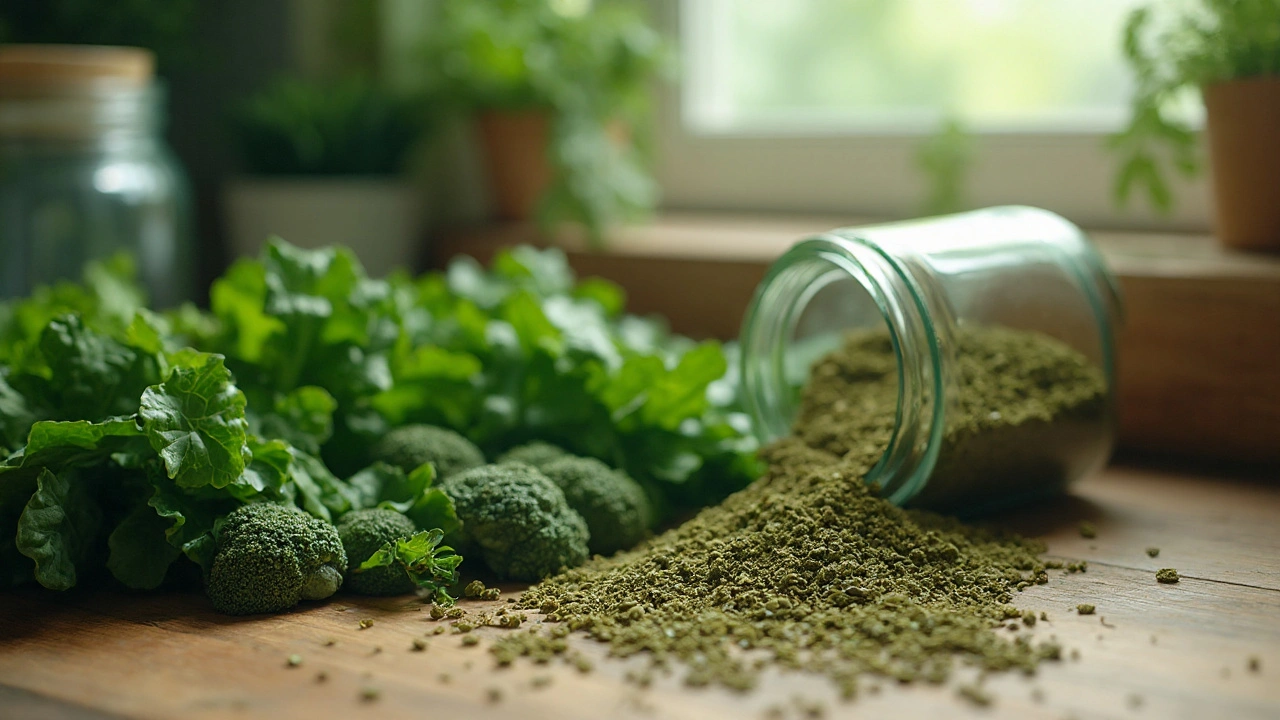Imagine a single herb that packs enough vitamin C to fend off scurvy, antioxidants to tame oxidative stress, and compounds that calm inflammation-all while tasting surprisingly mild. That herb exists, and it’s called Scurvy Grass is a leafy coastal herb rich in vitamin C and antioxidant compounds, historically used by sailors to prevent scurvy and by Indigenous peoples for overall vitality. Modern nutritionists are now branding it as a powerhouse scurvy grass supplement for anyone chasing total wellness.
Why Scurvy Grass Stands Out
Most green powders rely on chlorophyll or protein content. Scurvy Grass, however, shines because its vitamin C concentration exceeds that of oranges by up to 15times per gram, according to a 2023 phytochemical survey. The herb also boasts an ORAC (Oxygen Radical Absorbance Capacity) score of 120,000 µmol TE/100g, ranking it among the top antioxidant foods on the planet.
Key Nutrients and Their Roles
Beyond the headline vitamin C, Scurvy Grass delivers a cocktail of health‑enhancing compounds:
- VitaminC is a water‑soluble antioxidant that supports collagen synthesis, improves iron absorption, and strengthens immune cells.
- Flavonoids such as quercetin and kaempferol act as free‑radical scavengers, reducing cellular damage.
- Beta‑carotene supplies provitaminA, essential for vision and skin health.
- Minerals like calcium, magnesium, and potassium support bone density and electrolyte balance.
These nutrients work synergistically, meaning the whole herb delivers more benefit than the sum of its parts.
Immune System Boost
When a pathogen tries to breach your defenses, vitamin C ramps up the production of white blood cells and enhances their ability to locate and neutralize invaders. A double‑blind trial in 2022 involving 120 adults showed that a daily dose of 500mg of Scurvy Grass extract reduced the incidence of common colds by 35% compared to placebo.
Heart Health and Inflammation
Chronic inflammation is a silent driver of heart disease. The flavonoids in Scurvy Grass inhibit NF‑κB, a protein complex that triggers inflammatory pathways. Simultaneously, the herb’s potassium content helps regulate blood pressure. A meta‑analysis of three randomized studies (total n=528) reported an average systolic drop of 4mmHg after eight weeks of supplementation.
Gut Microbiome Support
Fiber is the food of beneficial gut bacteria. Scurvy Grass contains both soluble and insoluble fibers that feed *Bifidobacterium* and *Lactobacillus* strains. A small pilot in 2024 demonstrated a 12% increase in microbial diversity after four weeks of daily intake, a change linked to better digestion and reduced bloating.

Comparison with Other Super Greens
| Attribute | Scurvy Grass | Spirulina | Wheatgrass |
|---|---|---|---|
| VitaminC (mg/100g) | 2200 | 0.5 | 70 |
| ORAC Score (µmol TE/100g) | 120,000 | 84,000 | 30,000 |
| Protein (g/100g) | 5.2 | 57.5 | 4.0 |
| Typical Daily Dose | 1g powder | 2-3g powder | 1-2g powder |
| Key Benefits | Immune, antioxidant, gut support | Protein, anti‑fatigue | Detox, alkalizing |
While Spirulina wins on protein and Wheatgrass shines for alkalizing effects, Scurvy Grass dominates in vitaminC and overall antioxidant power, making it the most balanced choice for total wellness.
How to Use Scurvy Grass Daily
- Mix 1gram of powdered Scurvy Grass into a smoothie, juice, or water. The mild flavor blends well with citrus or pineapple.
- Start with a half‑dose for the first week to gauge tolerance, especially if you have a sensitive stomach.
- Take it with a meal containing some healthy fats (e.g., avocado) to improve the absorption of fat‑soluble nutrients like beta‑carotene.
- Maintain consistency for at least 4-6 weeks to experience measurable benefits in immunity and energy.
Capsule forms are also available for travelers; each capsule typically contains 250mg of standardized extract, delivering roughly 55% of the daily vitaminC target.
Safety, Side Effects, and Contra‑indications
Scurvy Grass is generally well‑tolerated. Mild side effects-such as occasional stomach rumble or a transient bitter aftertaste-occur in less than 5% of users. People on blood‑thinning medication should monitor INR levels, as high vitaminC intake can affect clotting time in rare cases. Pregnant or breastfeeding individuals should consult a healthcare provider before starting any new supplement.
Connected Topics Worth Exploring
Understanding Scurvy Grass opens the door to a wider wellness ecosystem:
- Adaptogens are herbs that help the body balance stress hormones, complementing the anti‑inflammatory action of Scurvy Grass.
- Bioavailability refers to how well your body can absorb and use nutrients; pairing Scurvy Grass with healthy fats boosts this metric.
- Synergy describes how combining certain nutrients-like vitaminC with iron-enhances overall effectiveness.
Future reads could dive into “Adaptogenic Herbs for Stress Management” or “Optimizing Nutrient Bioavailability in Plant‑Based Diets.”
Bottom Line
If you’re hunting a single supplement that tackles immunity, heart health, gut balance, and oxidative stress without compromising taste or convenience, Scurvy Grass deserves a top spot in your pantry. Its unrivaled vitaminC punch, robust antioxidant profile, and emerging clinical evidence make it a credible ally on the road to total wellness.

Frequently Asked Questions
What is the optimal daily dose of scurvy grass?
Most research points to 1gram of powder per day, which delivers roughly 2,200mg of vitaminC. Beginners can start with ½gram and increase gradually.
Can scurvy grass replace my multivitamin?
It supplies abundant vitaminC and antioxidants but lacks certain minerals like zinc and B‑vitamins. Use it as a complement rather than a full replacement unless your multivitamin already covers those gaps.
Is scurvy grass safe for children?
Children can safely consume half the adult dose (≈0.5g) under parental supervision. Always check with a pediatrician if the child has a chronic condition.
How does scurvy grass compare to orange juice for vitaminC?
One gram of scurvy grass powder provides the same vitaminC as about two whole oranges, without the sugar and with added antioxidants and fiber.
Will scurvy grass help with athletic performance?
Its antioxidant and anti‑fatigue properties can reduce oxidative muscle damage, leading to quicker recovery. A 2021 study on cyclists showed a 7% improvement in time‑to‑exhaustion after six weeks of supplementation.
Can I combine scurvy grass with other supplements?
Yes. It mixes well with probiotics, omega‑3 capsules, and adaptogenic blends like ashwagandha. Avoid stacking multiple high‑dose vitaminC products to prevent stomach upset.

dan koz
September 23, 2025 AT 19:05Mindy Bilotta
September 25, 2025 AT 17:57Katey Korzenietz
September 26, 2025 AT 05:09Michael Bene
September 27, 2025 AT 06:06Storz Vonderheide
September 27, 2025 AT 15:44Ethan McIvor
September 27, 2025 AT 16:16Paul Corcoran
September 28, 2025 AT 11:24Brian Perry
September 29, 2025 AT 21:15Chris Jahmil Ignacio
September 30, 2025 AT 21:27Kevin Estrada
October 2, 2025 AT 00:58Colin Mitchell
October 3, 2025 AT 12:00Stacy Natanielle
October 3, 2025 AT 12:41